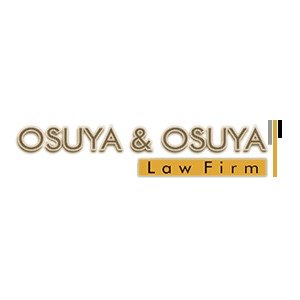Best Civil Litigation Lawyers in Abuja
Share your needs with us, get contacted by law firms.
Free. Takes 2 min.
List of the best lawyers in Abuja, Nigeria
Nigeria Civil Litigation Legal Questions answered by Lawyers
Browse our 1 legal question about Civil Litigation in Nigeria and read the lawyer answers, or ask your own questions for free.
- Damages claims from non payments of terminal benefits
- A new company taking over a liability ( with the terminal benefits from the former company inclusive) and refused payment for 4years plus and counting ..
-
Lawyer answer by Nomos Legal Practice
Hello and thank you for your interest to hire a lawyer to claim or receive damages from non-payments of terminal benefits for over 4 years and counting.We increase access to justice globally as we advise clients on their rights and...
Read full answer
About Civil Litigation Law in Abuja, Nigeria
Civil Litigation is a legal process through which individuals or organizations resolve their disputes in court. In Abuja, Nigeria, Civil Litigation cases involve non-criminal legal issues between parties seeking compensation, injunctions, or other legal remedies. These cases can cover a wide range of matters, including contract disputes, personal injury claims, property disputes, and more.
Why You May Need a Lawyer
There are several situations where you may need to consult a lawyer specialized in Civil Litigation in Abuja, Nigeria:
- If you believe your rights have been violated and you seek compensation or justice.
- If you are involved in a contract dispute and need legal assistance in enforcing or rescinding the terms.
- If you have suffered a personal injury due to someone else's negligence and want to pursue a claim for damages.
- If you are facing a property dispute, such as boundary disagreements or landlord-tenant conflicts.
- If you are being sued and need to defend yourself in court.
Local Laws Overview
Understanding the key aspects of local laws in Abuja, Nigeria, is important when dealing with Civil Litigation. Some notable points include:
- In Abuja, the legal system is based on a combination of Nigerian common law, customary law, and statutory law.
- The Federal High Court and High Court of the Federal Capital Territory, Abuja, have jurisdiction over most Civil Litigation cases in the city.
- It is crucial to be aware of the applicable statutes of limitations, as they dictate the time within which a lawsuit must be filed.
- The rules of evidence and procedural requirements must be followed in civil cases, so it is essential to adhere to them when preparing your case.
Frequently Asked Questions
Q: How long do I have to file a lawsuit in Abuja, Nigeria?
A: The statute of limitations varies depending on the type of case. For example, personal injury claims generally have a limitation period of three years, while breach of contract claims may have a limitation period of six years. It is important to consult with a lawyer to determine the specific time limit applicable to your case.
Q: Can I represent myself in Civil Litigation cases in Abuja, Nigeria?
A: Yes, individuals have the right to represent themselves in court. However, it is advisable to hire a lawyer, especially in complex cases, as they have the legal knowledge and experience to effectively navigate the Civil Litigation process and present your case in the best possible light.
Q: How long does a Civil Litigation case typically take to resolve in Abuja?
A: The duration of a case can vary significantly depending on various factors, including the complexity of the dispute, court availability, and the parties involved. Some cases may be resolved within a few months, while others can take several years to reach a conclusion.
Q: Can I settle a Civil Litigation case out of court in Abuja, Nigeria?
A: Yes, parties involved in a Civil Litigation case can negotiate a settlement out of court. Settlements allow for a mutually agreed resolution and can save time, money, and the stress associated with a trial. It is important to seek legal advice to ensure your interests are protected during the settlement process.
Q: What is the role of alternative dispute resolution methods in Civil Litigation in Abuja?
A: Abuja, Nigeria encourages the use of alternative dispute resolution methods, such as mediation or arbitration, to resolve Civil Litigation cases. These methods provide parties with a more flexible and cost-effective means of settling their disputes outside of court. However, it is important to note that not all cases are suitable for alternative dispute resolution, and the decision to pursue these methods should be made in consultation with a lawyer.
Additional Resources
Here are some resources, governmental bodies, and organizations that can provide further assistance related to Civil Litigation in Abuja, Nigeria:
- Abuja Multi-Door Courthouse: https://amdc.org.ng
- Nigerian Bar Association - Abuja Branch: https://abarofabuja.org
- Federal High Court, Abuja: http://www.fhc.gov.ng
Next Steps
If you require legal assistance in Civil Litigation in Abuja, Nigeria, it is recommended to take the following steps:
- Gather all relevant documents and information related to your case.
- Research and shortlist experienced lawyers specializing in Civil Litigation in Abuja.
- Schedule consultations with potential lawyers to discuss your case and their expertise.
- Select a lawyer you feel comfortable working with and engage their services.
- Collaborate closely with your lawyer to build a strong case and follow their guidance throughout the litigation process.
Lawzana helps you find the best lawyers and law firms in Abuja through a curated and pre-screened list of qualified legal professionals. Our platform offers rankings and detailed profiles of attorneys and law firms, allowing you to compare based on practice areas, including Civil Litigation, experience, and client feedback.
Each profile includes a description of the firm's areas of practice, client reviews, team members and partners, year of establishment, spoken languages, office locations, contact information, social media presence, and any published articles or resources. Most firms on our platform speak English and are experienced in both local and international legal matters.
Get a quote from top-rated law firms in Abuja, Nigeria — quickly, securely, and without unnecessary hassle.
Disclaimer:
The information provided on this page is for general informational purposes only and does not constitute legal advice. While we strive to ensure the accuracy and relevance of the content, legal information may change over time, and interpretations of the law can vary. You should always consult with a qualified legal professional for advice specific to your situation.
We disclaim all liability for actions taken or not taken based on the content of this page. If you believe any information is incorrect or outdated, please contact us, and we will review and update it where appropriate.












